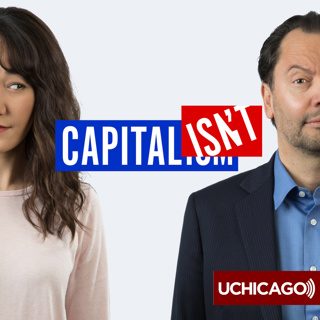
A Firm Grip on the Labor Market
The U.S. economy may be booming, but despite a recent uptick wage growth remains stubbornly flat. Kate & Luigi examine the effect of monopsonies in the labor market among concentrated industries like Big Tech. Are companies colluding against workers and driving down wages?
15 Mars 201829min

O. Contin Pusher, M.D.
Are doctors and pharmaceutical companies to blame for the opioid epidemic? Kate & Luigi look at the role of supply and demand in fueling the distribution of prescription painkillers, and discuss the regulatory ramifications for medical marijuana.
1 Mars 201828min

The Moral Case Against the MBA
Are elite MBA programs producing morally bankrupt administrators? Duff McDonald, author of “The Golden Passport,” tries to convince Luigi & Kate that conflicts of interest and flawed case studies amount to an unethical education that harms society.
15 Feb 201826min

Capital Isn't in the 21st Century
Five years after Thomas Piketty’s surprise bestseller captured the zeitgeist of an anxious age, Kate and Luigi revisit the book to see how it holds up in the current political and economic climate. The verdict? Intriguing analysis, but limited impact.
1 Feb 201830min

Strange Fedfellows
It’s been 6 years since a member of the Federal Reserve improperly leaked information to an analyst. Kate & Luigi wonder what's really changed. Is the Fed still too cozy with big banks, the media and others with a financial stake in monetary policy?
18 Jan 201827min

College: What is it Good For?
As college enrollment goes up, social mobility continues its 50-year decline. Luigi and Kate look for answers in the latest research on the role of higher education. Are today’s universities engines of social mobility or simply bastions of privilege?
4 Jan 201827min

Mutual Understanding: Is Your 401k Working Against You?
Luigi shops for an airline ticket and ponders how our retirement investments might be hurting our wallets. New research suggests that giant mutual funds with large stakes in the companies of one industry can lead to reduced competition and higher prices.
4 Jan 201826min

Obama Wanted a Corporate Tax Cut Too
The new U.S. tax reform bill includes a dramatic reduction in the corporate tax rate. Is this a hand-out to the rich or a necessary measure to spur the U.S. economy in the face of global competition? Luigi and Kate debate the pros and cons and break down the law’s impact on pass-through businesses.
4 Jan 201829min






















